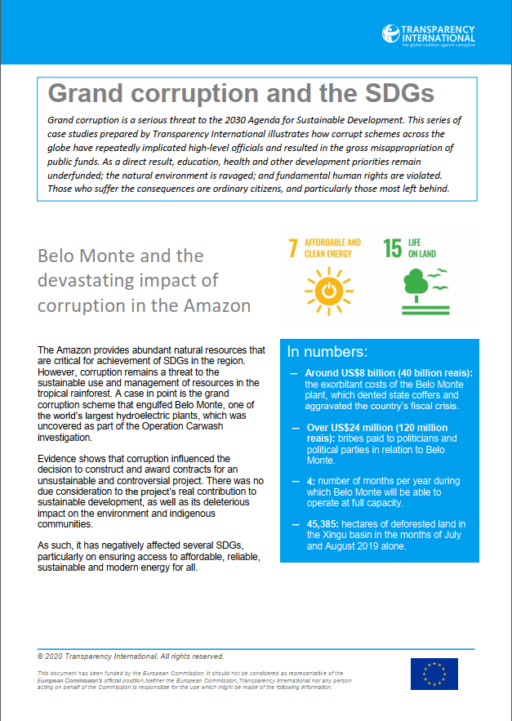- Home
- Grand Corruption and the SDGs: Belo Monte and the devastating impact of corruption in the Amazon
Grand Corruption and the SDGs: Belo Monte and the devastating impact of corruption in the Amazon
Description
The Amazon provides abundant natural resources that are critical for achievement of SDGs in the region. However, corruption remains a threat to the sustainable use and management of resources in the tropical rainforest. A case in point is the grand corruption scheme that engulfed Belo Monte, one of the world’s largest hydroelectric plants, which was uncovered as part of the Operation Carwash investigation.
Evidence shows that corruption influenced the decision to construct and award contracts for an unsustainable and controversial project in the Amazon. There was no due consideration to the project’s real contribution to sustainable development in the energy sector, as well as its deleterious impact on the environment and indigenous communities.
As such, it has negatively affected several SDGs, particularly on ensuring access to affordable, reliable, sustainable and modern energy for all.
In numbers
- Around US$8 billion (40 billion reais): the exorbitant costs of the Belo Monte plant, which dented state coffers and aggravated the country’s fiscal crisis.
- Over US$24 million (120 million reais): bribes paid to politicians and political parties in relation to Belo Monte.
- 4: number of months per year during which Belo Monte will be able to operate at full capacity.
- 45,385: hectares of deforested land in the Xingu basin in the months of July and August 2019 alone.
Authors
Guilherme France (Transparência Internacional Brasil) and Jorum Duri (Transparency International)
Reviewers
Matthew Jenkins (Transparency International) and Maria Dominguez (Transparência Internacional Brasil)
Date
22/12/2020
Tags
 Download PDF
Download PDF
